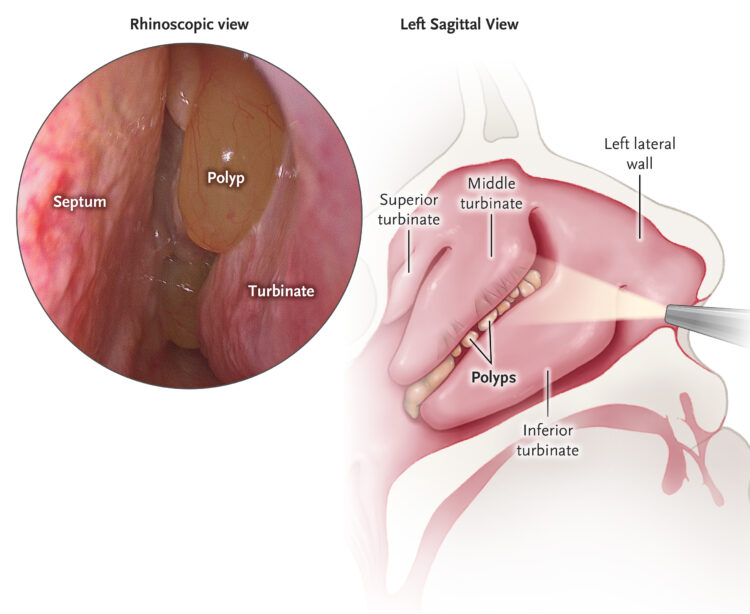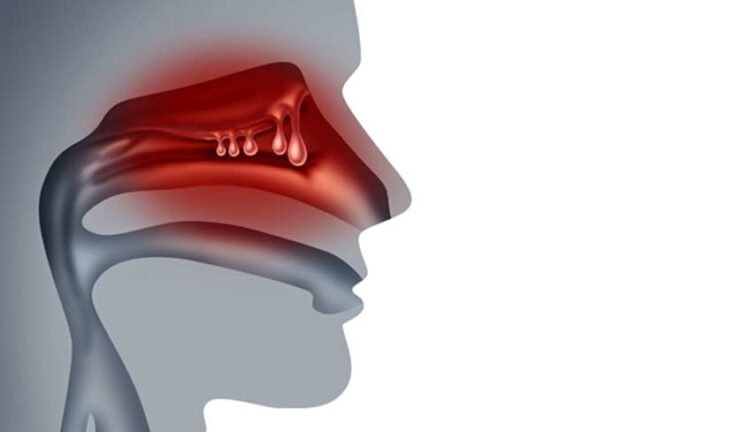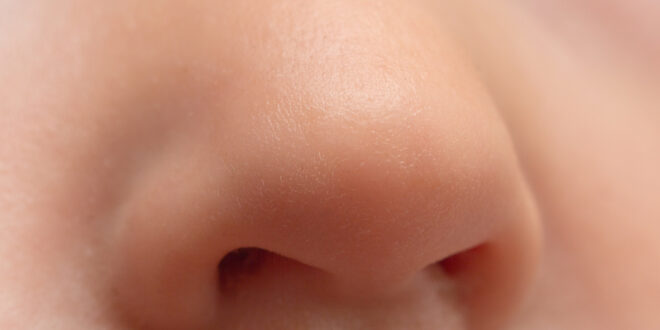Are you suffering from a chronic cold or nasal congestion which seems endless? Or has the usual over the counter cold and allergy treatment been of little use? Then, perhaps, you have nasal polyps. Your otolaryngology clinic is the most suitable practice to help you with an accurate diagnosis and treatment regime.
So, what exactly are nasal polyps? These are soft, painless, benign growths lining the nasal tissues. Nasal polyps are generally tear-shaped which grows in size with time. Smaller polyps have less hindrance to nasal congestion and breathing issues, while larger polyps are associated with recurring infections and chronic inflammation. These polyps are more common in young adults although it may occur in anyone. Timely intervention can help in preventing recurring colds and nasal congestion. So let us explore the causes behind these nasal polyps:

What causes nasal polyps? The lining of the nasal cavity is protected by a wet layer called the mucosa. It helps in humidifying the air we breathe in, but if this layer gets swollen due to an infection or an allergy-induced irritation, then there is a chance for nasal polyps to grow. These polyps can block the nasal passage. Some of the common triggers of nasal polyps include:
- Chronic sinusitis
- Allergic rhinitis
- Asthma
- Sensitivity to medication such as aspirin or ibuprofen
Some individuals have a hereditary predisposition due to the presence of certain genes that cause their nasal lining to react to inflammation.
What are the signs & symptoms of nasal polyps? If you suffer from a stuffy nose and chronic sinusitis lasting over 12 weeks, you might be having nasal polyps. It is important to visit an ENT clinic to review your condition for corrective action.

A single small polyp may not hinder your nasal passage, but multiple growths into a large polyp increase the chances of nasal congestion. Some of the common signs and symptoms include:
- Constant runny nose
- Persistent stuffiness
- Sinus pain
- Postnasal drip
- Lack of ability to smell
- Headaches
- Pain in upper teeth
- Snoring
- Frequent nosebleeds
- Sense of pressure over forehead and face
How are nasal polyps diagnosed? An ENT specialist will be able to diagnose this condition after reviewing your symptoms and taking a closer look at your nasal cavity. This is generally done using an instrument called an otoscope. Polyps located in the interior of the nasal passage will need additional equipment to make a diagnosis. Some of the common detection methods include:
- Nasal endoscopy: A narrow tube is inserted with a camera and lighting element at one end to have a clear picture of your nasal interior CT/MRI scan: This helps your ENT surgeon to determine the exact size and location of the polyp. Scans can also reveal if there are any other nasal abnormalities or the presence of any malignant tumors.
- Skin Prick Allergy Testing: To rule out the cause of the polyp, your ENT doctor may order allergy testing to look into the cause of nasal inflammation. A panel of allergens will be deposited on the skin through tiny pricks to study how your immune system reacts to these allergens
- Cystic Fibrosis: If the polyps are present in a young child your doctor will order a test for cystic fibrosis along with another additional testing for genetic diseases.

Visiting an experienced ENT specialist early on, when you have nasal congestion or sinusitis can help to rule out nasal polyps. This will help you ease discomfort and continue on a trouble-free daily routine. Severe breathing difficulties and worsening of symptoms suddenly warrant an emergency ENT appointment.
How are nasal polyps treated? Medications to constrict the nasal polyp helps in reducing the size, thus relieving nasal congestion and other related symptoms. Your otolaryngologist may also prescribe nasal steroids to reduce symptoms and ease your stuffy nose. Common medications include fluticasone, mometasone, and budesonide. When the nasal sprays are ineffective, injectable steroids like prednisone are prescribed, although it is not a long-term treatment option. Sinus infections and allergies are treated through antibiotics and antihistamines. Sinus infections and allergies are treated through antibiotics and antihistamines, while mild allergy symptoms can be alleviated by using an allergen spray.
If managing conservatively is not helping improve symptoms, you will be recommended surgery. This will take into account, the size of the polyp and is usually performed as an outdoor procedure called a polypectomy. Larger polyps are dealt with endoscopic sinus surgery.
Following surgery, nasal sprays and saline washes help in preventing the reoccurrence of polyps. This is done to reduce the incidence of inflammation of the nasal cavity. Individuals with chronic nasal problems may, however, have a reoccurrence of polyps in some cases.
What are the complications due to nasal polyps? Multiple and large polyps block the airflow leading to a number of complications like:
Chronic or frequent sinus infections
Obstructive sleep apnea
Double vision due to alteration of the structure of your face.
How to prevent nasal polyps? Individuals who follow an ENT doctor’s advice on allergy and sinusitis are less likely to suffer from nasal polyps. This will help in controlling asthma and allergy conditions which lead to nasal inflammation and irritation. Apart from this, some of the other factors to consider are:
- Hygiene: Good hand hygiene reduces the risk of bacterial and viral infections causing nasal and sinus inflammation.
- Humidity: Using a humidifier if your home is dry.
- Avoiding irritants: Chemicals, allergens, and airborne pathogens help in reducing the risk of nasal polyps.
- Nasal rinse: A nasal rinse will help remove irritants and allergens causing nasal inflammation.
The ENT Clinic in Singapore has a strong team of doctors and staff with a wealth of experience treating ear, nose, and throat disorders to both pediatric and adult patients. The practice has two prime locations in the little red dot at Mount Elizabeth Novena Centre and Gleneagles Hospital. If you find yourself suffering from nasal polyps or another ENT predicament, you will be in strong hands at this practice.
 Hi Boox Popular Magazine 2024
Hi Boox Popular Magazine 2024



